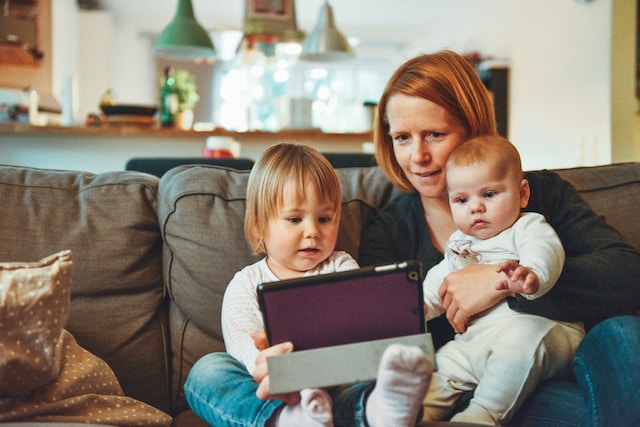Children are not an exception to the rule that screens have become an essential element of life in the current digital era. Kids of all ages have easy access to screens, be it televisions, laptops, tablets, or cellphones. Although there are many technological advantages, there are also worries about how it may affect kids’ mental health. We will examine the connection between screen time and kids’ mental health in this blog article, along with tips for parents and other carers on how to create a good balance.

The Increase in Screen Time
Children are now exposed to screens on a much larger scale due to the broad availability of the internet and the development of smartphones.
A Common Sense Media poll indicates that youngsters between the ages of 8 and 18 spend over seven hours a day in front of a screen. The importance of the problem at hand is highlighted by one number alone.
Effects on Emotional Well-Being
Overuse of screens has been connected to a number of issues with children’s mental health. The risk of screen addiction, which can result in social disengagement, anxiety, and despair, is one of the main concerns. Overusing the internet can also throw off sleep schedules, which makes mental health problems worse. In addition, the media that kids are exposed to, such violent video games or cyberbullying, can exacerbate mental discomfort.

The Value of Equilibrium
Recognising the positive aspects of screen usage is just as vital as acknowledging any possible drawbacks. Particularly in the modern world, screens may offer a feeling of connection to friends and family, and educational applications and websites can improve learning. Finding a balance between letting kids benefit from technology and minimising its negative effects on their mental health is crucial.
Limiting Screen Time
Limiting children’s screen time is a useful strategy for keeping this balance. The American Academy of Paediatrics’ recommendations, which state that kids between the ages of two and five should only have one hour a day of high-quality screen time, are advised by experts.
It’s critical to establish time limitations for older kids that correspond with their age and unique requirements.
Superior Quality Compared to Quantity
Screen time is not all the same. Stress the value of engaging encounters and high-quality information above passive consumption. Children should be encouraged to interact with creative games, educational applications, and other materials that foster problem-solving and critical thinking. Minimise pointless browsing or binge-watching periods that don’t contribute anything to learning or growth.
Tech-Free Areas
Set aside specific sections of your house, such the bedroom or the dining room, as tech-free zones. In addition to establishing limits, this makes sure screen time doesn’t get in the way of other life activities like family dinners and sound sleep.
Eliminating screens from the bedroom will greatly enhance the quality of your sleep, which can benefit your mental health.

Set an Example for Others
Kids get up skills from watching others. Children are more likely to use screens responsibly if parents and other carers do the same. Establish personal screen time limitations and give in-person conversations priority. In order to teach kids that there is a world outside of screens, encourage outdoor play and other offline pursuits.
Honest Communication
Encourage frank and nonjudgmental dialogue with your kids on their screen time. Talk about the advantages and disadvantages of using the internet, and invite them to express any worries or personal experiences they may have had. Establishing a secure environment for discussion might assist kids in making wise choices around their usage of screens.
Exercise
Promote physical exercise as a diversion from screen time. Exercise is a vital part of mental wellness since it has been shown to improve mood and lower stress levels. Encourage your kids to engage in physical activities they like, such as dancing or sports.
Keeping an Eye on Content
It’s vital to supervise the stuff your children consume online. Make sure kids are exposed to stuff that is appropriate for their age by using parental control tools and filters. Keep an eye on the applications they use, the websites they visit, and the individuals they communicate with online. It is imperative to safeguard kids against detrimental materials and virtual predators to ensure their safety and psychological welfare.
Utilising Screens Mindfully During the Pandemic
The distinction between screen time for education and leisure has become increasingly hazy in the wake of the COVID-19 epidemic. Children are spending increasingly more time in front of screens as remote learning becomes the standard. Screen usage should be monitored closely by parents and teachers to make sure it supports learning objectives while allowing for breaks and leisure activities.
Getting Expert Assistance
It is imperative that you get expert assistance if you observe notable changes in your child’s behaviour or mental health. A certified counsellor or therapist can offer direction and assistance according to your child’s needs. If you believe that your child’s screen usage is having a detrimental effect on their mental health, don’t be afraid to get in touch.
You may also like:
How to Protect Your Lungs from Air Pollution
Protecting Our Future: How to Help Children Cope with Trauma

